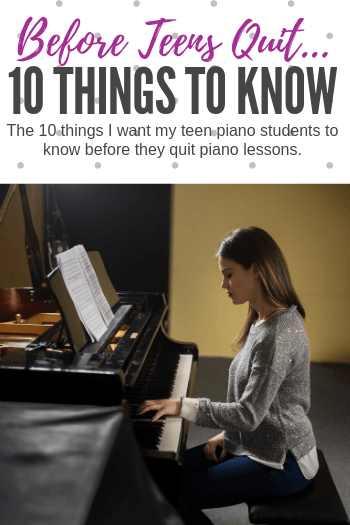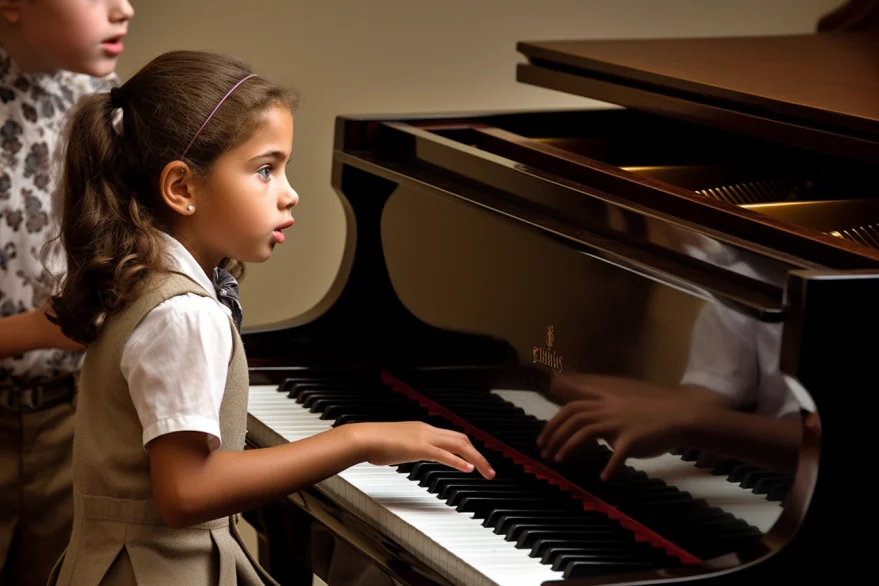Starting piano lessons is a big step for any child. It’s an exciting journey into the world of music.
But before diving in, there are a few important things to consider. Understanding what lies ahead can make a huge difference. It helps in setting the right expectations and preparing both you and your child. Music lessons can be fun, but they also require commitment and patience.
Knowing what to expect can make the process smoother and more enjoyable for everyone involved. From choosing the right piano to finding a good teacher, each decision plays a role in your child’s musical adventure. This guide will shed light on key aspects to consider, ensuring a positive and enriching experience. So, let’s explore what you should know before your child begins their piano lessons.
Choosing The Right Piano
Selecting the ideal piano is crucial before your child starts piano lessons. Consider the instrument’s size, sound quality, and maintenance needs. Ensure the piano fits comfortably in your home and suits your child’s learning style.
Choosing the Right Piano Selecting the right piano for your child can significantly impact their learning experience. It’s not just about getting any piano; it’s about finding one that suits your child’s needs and your family’s circumstances. Here are some key aspects to consider:
Acoustic Vs Digital
The first decision you’ll face is choosing between an acoustic and a digital piano. Acoustic pianos offer a traditional feel and sound. Many teachers recommend them for beginners. They provide a rich, authentic sound and a tactile experience that digital pianos often struggle to replicate. Digital pianos are more versatile. They come with various features like volume control, headphone jacks, and built-in learning tools. They are also more affordable and require less maintenance compared to acoustic pianos. Consider what might work best for your home and your child’s learning style.
Considering Your Budget
Budget is a crucial factor in choosing the right piano. Acoustic pianos can be quite expensive. A decent upright piano can cost several thousand dollars. You’ll also need to factor in ongoing maintenance costs like tuning and repairs. Digital pianos are generally more affordable. You can find quality digital pianos for a few hundred dollars. They require little to no maintenance, which can save you money in the long run. Think about what you can comfortably spend. Investing wisely now can help avoid regrets later. — When my niece started piano lessons, we opted for a digital piano. It fit well in their small apartment and allowed her to practice without disturbing neighbors. What will work best for your child’s learning environment? Choosing the right piano sets the foundation for their musical journey. Make the choice that aligns with your budget and your child’s needs.
Finding A Qualified Teacher
Starting piano lessons is an exciting step for your child. Finding the right teacher is crucial. A good teacher can inspire and motivate. They can make learning fun and effective. But how do you know who to choose? Here are some tips to help.
Credentials To Look For
Check the teacher’s qualifications. Do they have a music degree? Have they studied piano at a recognized institution? Experience matters too. How long have they been teaching? Do they have experience with children? These are important questions to ask.
Ask for references. Talk to other parents. Find out if their kids enjoy lessons. A good teacher should have positive reviews. Look for someone who can explain concepts clearly. They should also be patient and encouraging.
Trial Lessons
Consider trial lessons. Many teachers offer them. This is a great way to see if they are a good fit. During the trial, observe how they interact with your child. Do they make the lesson enjoyable? Are they patient? Do they give clear instructions?
Trial lessons can also help your child. They can see if they like the teacher. It reduces the risk of committing to a full term. It ensures that both the teacher and student are comfortable with each other.
Setting Realistic Expectations
Starting piano lessons requires patience and realistic expectations. Progress can be slow, and consistent practice is essential. Celebrate small achievements to keep your child motivated.
Before your child starts piano lessons, it’s important to set realistic expectations. Understanding what to expect can help avoid frustration and foster a positive learning environment. Here are some key points to consider.
Progress Timeline
Don’t expect overnight success. Learning piano is a gradual process. Your child might start with simple tunes and scales. Complex pieces will come later. Celebrate small milestones. Each accomplishment builds confidence.
Practice Commitment
Regular practice is crucial. Pencil in daily sessions. Start with short, manageable durations. Increase as your child becomes more comfortable. Make practice enjoyable. Encourage your child with praise and fun challenges. How will you support your child’s practice routine? Think about ways to make it engaging and consistent. By setting realistic expectations, you can help your child enjoy their musical journey. What other tips have worked for you when setting expectations?

Credit: www.teachpianotoday.com
Creating A Practice Schedule
Starting piano lessons is a big step for any child. Developing a practice schedule is crucial. It helps build discipline and improves skills. A well-planned schedule ensures consistent progress.
Daily Routine
A daily practice routine is essential. It helps your child get used to the piano. Schedule short practice sessions every day. 15-20 minutes is a good start. Gradually increase the time as they get comfortable.
Consistency is key. Choose a time that fits well into their day. Morning, afternoon, or evening – find what works best. Stick to the chosen time every day.
Balancing With Other Activities
Your child likely has other commitments. School, sports, and hobbies need time too. Balance is important. Avoid overwhelming them. Mix piano practice with other activities. This keeps them interested and less stressed.
Create a flexible schedule. Allow adjustments when needed. If they have a busy day, shorten practice time. On free days, extend it a bit. This keeps their routine adaptable and enjoyable.
Understanding Costs
Starting piano lessons for your child is an exciting journey. But understanding the costs involved is crucial. Knowing the financial aspects helps you plan better. It ensures a smooth learning experience for your child. Let’s break down the key expenses you should consider.
Lesson Fees
Piano lesson fees can vary widely. They depend on the teacher’s experience and location. Private lessons usually cost more than group sessions. Typical fees range from $20 to $100 per session. Some teachers offer discounts for paying in advance. It’s important to compare rates in your area. This helps you find the best value for your budget.
Additional Expenses
Beyond lesson fees, there are other costs to consider. A piano or keyboard is a must. Digital keyboards are cheaper than acoustic pianos. But consider quality and durability. You might also need to budget for sheet music. Some teachers require specific books. Regular tuning for acoustic pianos is another cost. It keeps the instrument in good shape. Finally, consider accessories like a metronome or piano bench. These enhance the learning experience.
Creating A Positive Practice Environment
Your child’s piano journey begins not only with lessons but also with the environment in which they practice. Creating a positive practice environment is crucial for fostering both focus and enjoyment. A well-crafted space can make practice sessions something your child looks forward to, rather than a chore. You might wonder, what does it take to set up the ideal space? Let’s dive into two essential components: quiet space and necessary equipment.
Quiet Space
Choose a quiet room where your child can concentrate without distractions. A space free from the hustle and bustle of daily life helps maintain focus. Consider rooms away from the television or busy kitchen.
Keep it simple and clutter-free. A clean space can promote clarity and concentration. You might find that when your child isn’t surrounded by toys or other distractions, their focus improves.
What works for one might not work for another. Observe where your child seems most at ease and adjust the space accordingly. Sometimes, a cozy corner with a few cushions can make all the difference.
Necessary Equipment
Ensure the piano is in excellent condition. Regular tuning is essential for maintaining sound quality. A well-tuned piano can inspire your child to play more confidently.
Invest in a comfortable bench. An adjustable bench can help your child maintain proper posture. This simple addition can prevent discomfort and make longer practice sessions more feasible.
Consider adding a metronome and a music stand. A metronome aids in developing a sense of rhythm, while a stand keeps music organized and at eye level. Such tools can enhance your child’s learning experience significantly.
Creating a positive practice environment is more than just setting up a space; it’s about nurturing your child’s musical growth. How can you transform a corner of your home into a haven for musical inspiration?
Learning The Basics
So, your child is about to start their piano journey, and you’re probably wondering how to make the most of it. Learning the basics is essential for a strong foundation. Let’s dive into some key areas: reading music and basic techniques.
Reading Music
Understanding how to read music is crucial for any budding pianist. It’s like learning a new language. Start with the basics of musical notation, like notes and rhythms.
Introduce your child to the musical staff, which consists of five lines and four spaces. Each line and space represents a different musical note. Use simple songs to practice reading these notes.
Consider using apps or online games that make reading music fun and interactive. They can help reinforce what your child is learning in their lessons. Have you tried flashcards? They can be a great tool for quick daily practice.
Basic Techniques
Good technique is essential for playing the piano well and avoiding injury. Start with hand positioning. Your child’s hands should be relaxed, with fingers curved and poised over the keys.
Teach them about finger numbers. Each finger is assigned a number from one (thumb) to five (pinkie). This helps with following fingerings in sheet music.
Encourage your child to practice scales. Scales are the building blocks of music and help improve finger strength and dexterity. How often should they practice? Ideally, a little bit every day. Consistency is key.
Remember, patience is crucial. Progress might seem slow at first, but each small step builds a solid foundation. Celebrate their efforts and make learning fun!
Encouraging Consistency
Consistency is key to learning any new skill, including playing the piano. Regular practice helps children build muscle memory and improve their skills. It also instills discipline and a sense of responsibility. But how can you encourage your child to stay consistent without making it feel like a chore? Here are some tips to help you.
Motivation Tips
Motivation plays a big role in maintaining consistency. Start by setting small, achievable goals. Celebrate each milestone, no matter how small. This can help keep your child motivated and excited about their progress.
Another way to motivate your child is by showing interest in their practice. Ask them to play a song for you. Show genuine excitement and praise their efforts. This can make them feel proud and more eager to practice regularly.
Reward Systems
A reward system can be a great way to encourage consistency. Create a simple reward chart where your child earns a sticker for each practice session. After collecting a certain number of stickers, they can choose a reward. This could be a small toy, a special treat, or extra screen time.
Keep the rewards simple and aligned with their interests. The key is to make the practice sessions rewarding and fun, not just another task. This can help your child look forward to their piano lessons and stay consistent with their practice.
Dealing With Frustration
Starting piano lessons can be exciting for your child. But it can also bring frustration. Learning an instrument is a challenge. Mistakes happen often. Notes get missed. Fingers slip. It’s normal for a child to feel upset. Parents play a key role. Helping a child manage these feelings is important. Positive support makes a big difference.
Encouraging Patience
Patience is crucial in learning piano. Progress takes time. Teach your child that small steps are important. Celebrate little victories. Praise them for effort, not just results. Show them that practice is key. Explain that everyone makes mistakes. Share stories of famous musicians. They faced struggles too. This helps your child stay motivated.
Overcoming Challenges
Challenges will appear. Some pieces will be hard. Fingers might not move fast enough. Help your child see challenges as chances to grow. Set realistic goals. Break tasks into smaller parts. Smaller tasks are easier to manage. Encourage regular practice. Practice builds skill and confidence. Remind them that success doesn’t come instantly. It comes with time and dedication.
Exploring Different Music Styles
Understanding music styles can help your child appreciate piano lessons more. Knowing the basics, such as scales and rhythms, is essential. Encourage listening to various genres to spark interest.
Embarking on your child’s piano journey is an exciting adventure. One of the key aspects to consider is the variety of music styles your child might encounter. Different music genres offer unique experiences and skills, enriching their learning process and keeping their interest alive.
Classical Music
Classical music forms the backbone of piano education. It’s like learning the alphabet before writing sentences. This style enhances technical skills and introduces fundamental music theory. Think about Beethoven and Mozart. Their compositions teach patience and discipline. Encouraging your child to practice these pieces can build a strong foundation. But don’t worry about them getting bored. Many classical pieces are dramatic and full of emotion. They might even find a favorite piece that resonates with them.
Modern Genres
Modern genres can bring a fresh twist to piano lessons. Jazz, pop, and blues are fun and engaging for young learners. They add variety and keep practice sessions lively. Consider introducing your child to a pop song they love. Imagine their excitement when they can play it on the piano. It can motivate them to practice more. Jazz can introduce them to improvisation. It encourages creativity and helps develop a unique style. Who knows, your child might discover a hidden talent for composing their own music. Have you thought about which style your child might enjoy the most? Encouraging exploration in different genres can make their piano journey more enjoyable.
Frequently Asked Questions
What To Know Before Starting Piano Lessons?
Know your goals and musical interests. Invest in a quality piano or keyboard. Commit to regular practice. Find a qualified teacher. Understand basic music theory.
At What Age Should A Child Start Piano Lessons?
Most children can start piano lessons at age 5 or 6. Early exposure helps develop musical skills. Each child is unique, so consider their interest and readiness.
What Is The Best Piano Teaching Method For Kids?
The Suzuki Method is highly recommended for kids. It emphasizes ear training, repetition, and parent involvement, making learning fun and effective.
How Much Should A 7 Year Old Practice Piano?
A 7-year-old should practice piano for 15-30 minutes daily. Consistent, short sessions help maintain interest and progress.
Conclusion
Starting piano lessons is an exciting journey for your child. Preparation matters. Knowing these 10 tips can make a big difference. Encourage practice. Stay patient. Celebrate progress, no matter how small. Create a fun, supportive environment. Choose the right teacher.
Set realistic goals. Maintain a regular schedule. Be involved. Listen to their music. Enjoy the process together. By doing these things, you help your child succeed and love piano.

